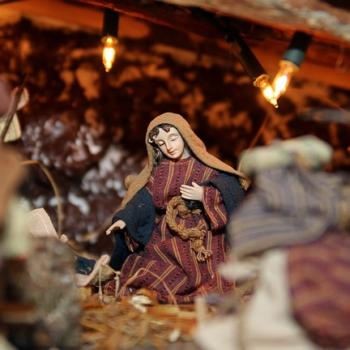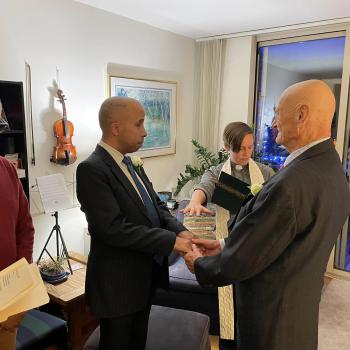You make the Baptismal Covenant a central part of the book, and I agree that it ought to be a central part of our way of understanding who we are. How does that covenant repeated by people entering the faith and people in the pews help us understand how and what we are?
Rumor is that the baptismal covenant was a document that was created on the eve of prayer book revision in a room filled with liturgy nerds who felt we could do better. In the dark hours of the night they wrote out the covenant. It turns out that is sometimes how the Holy Spirit works . . . in a small room with friends gathered for a common cause, no time, pen and paper, along with a lot of creative space. I think the covenant has shaped us more than we know. I was confirmed in 1978, and I learned the prayer book backward and forward as the foundation for my own faith. I think in part that is what comes out in the book.
Painting with a wide brush here, I would say that the Protestant churches depend solely on scripture and confessionals. The Roman Church solely on its teaching of the faith. Somehow, we as Anglicans have this book of worship, the Book of Common Prayer, which is the community's struggle with the scripture, creeds, and faith of the church. It is the place where we go when we are joyful and when we are sorrowful. It is the place we go to find words when there are none. It is the place where we find questions as well as answers. So, our Book of Common Prayer itself is this shaping tool for those who choose to follow Jesus in the Episcopal Tradition.
Key to our Book of Common Prayer is the baptismal service. That is a huge shift in this edition and when that occurred, it meant that we placed a lot of focus on the Baptismal Covenant as a key document. I say all of this because I don't think it helps us understand how and what we are, so much as it helps us understand where we are. The Covenant helps us find ourselves in the midst of relationship with God and with one another. It locates our spiritual journey in the midst of the spiritual journey of a whole community of faithful people who believe in salvation history. It moves us along toward our final destination by engaging our internal GPS; so it is we find ourselves in relationships with God, God's creation, other human beings, and with power. In all, it helps us discover that we come from love, move through the world in love, and are always in the process of returning to love.
Episcopalians have traditionally been bad at evangelizing, perhaps as a response to the way they've seen other traditions carry it out, perhaps because for much of its history the Episcopal Church has been a bastion of money and power and so didn't feel inclined to invite others in, but in recent years, the national church, like almost every denomination, has been in decline. You've made evangelism a priority in your episcopate, and devote a lot of space to it in the new book. What does evangelism mean to you, and how could we all do it better and more authentically?
I believe that the work of the church is evangelism and mission. Evangelism is sharing the Good News of Salvation through God in Christ Jesus with the world around us. Mission is doing that Gospel work through deeds. As Episcopalians we do both; it is not an either/or proposition. It is the very work of the church to help people come to God.
William Temple, the Archbishop of Canterbury during World War II, stated that evangelism is "the presentation of Jesus Christ, in the power of the Holy Spirit, in such ways that persons may be led to him as Savior, and follow him as Lord within the fellowship of his Church." We are to do this work and bring people into the fellowship of God's Church, and for us that is the Episcopal Church. This is our work.
But let me say a few things that are important to understand. Episcopalians understand that we come to experience God as savior and to follow him through our own life experiences and stories. Episcopalians believe that it is in Christian fellowship that we come to know Jesus in the power of the Holy Spirit, and that such stories are translated and interpreted through the eyes of worship and scripture. What Temple seemed to fail to understand is that we as Anglicans and Episcopalians don't help people meet Jesus and then invite them to church; it is the opposite. We invite them to church, where we present and engage them in the telling of stories, the worship of God, and through fellowship, we discover our salvation.
I believe Episcopalians love God. Episcopalians love their church. Episcopalians would be happy to have people come to their church. In fact, Episcopalians don't mind telling you about their church.





